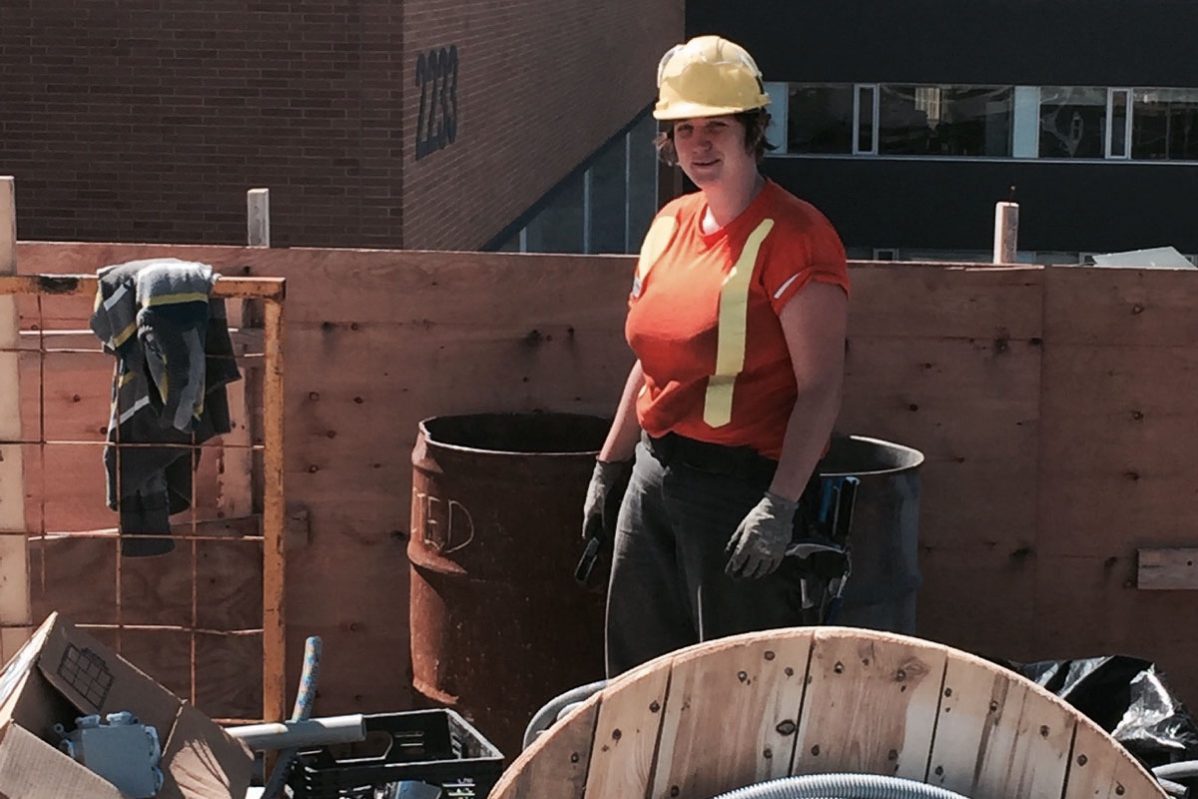Megan Kinch on the lack of women in the construction trades and on-the-job discrimination
It doesn’t get better.
I’ve been a woman working in men’s jobs since 1999, and today I’m three years into my apprenticeship as a construction electrician. There’s always this refrain that it’s just new, that things will get better, that somehow there will be more women in the trades naturally because, well, progress.
Since women were legally allowed to work in construction, the percentage of women has effectively flatlined. Over the past 40 years, the figure for women in the construction trades in Canada has stayed at around four per cent. Some trades have even fewer women. The low numbers in the construction trades remain despite women occupying 48 per cent of jobs across all industries in Canada.
If you’re at a trades school like George Brown College, it might seem like things are going well. But the number of women in training programs represents women at the beginning of their careers, not those finishing their apprenticeships or mid-career. Women are interested in trades careers at rates far higher than their single-digits percentage of workers.
Statistics Canada reported that in 2015, 6,543 men completed electrician apprenticeships, compared to 171 women. That’s 38 times more men than women finishing my apprenticeship.
There’s this illusion that things are constantly getting better, partly because there is always a flow of new women entering the trades and it seems like the next wave of workers will be more female. But, this hasn’t happened.
There is massive attrition of women workers. This is due to many factors, not just the least of which is persistent sexual and gender harassment. In my experience, there’s also a thing, practiced mainly by white dudes, where they completely ignore women workers. Not only are women not mentored, their existence is often not even acknowledged by co-workers.
There are also structural barriers that specifically affect mothers. The construction day usually starts at 6:30 a.m. or 7 a.m., but there is no childcare available at this time. There is often overtime or weekend work, which can happen unpredictably. Other women workers tell me how, even if they’re unionized, women workers get laid off if they’re pregnant, due to a so-called shortage of work.
Measures to fight sexual harassment in an environment that is incredibly sexist can backfire. I’ve only seen one worker ever fired for harassment, and it was a Black woman. She had been persistently bothered by this group of masons, vile things were said to her, she had things thrown at her. After weeks of this, she finally reacted and it was her that got fired for harassment while in fact she was the victim of racist and gendered bullying. The harassment claim became part of the harassment.
It bothers me when, as frequently happens, someone turns to me and says something like “well it must be an advantage in the trade, being a woman.” I think, WTF. Why would you think that was an advantage? If it were an advantage, you’d be seeing women working in trades at rates far higher than a few per cent.
In my experience, there are no quotas in place, no human resources, no anything. It’s a massive disadvantage and people aren’t even aware of it, feeling like this is a problem that was solved long ago.
I’m reminded of a recent article by Chika Stacy Oriuwa when she was writing, in 2018, as the only Black medical student in her cohort at University of Toronto. Out of 259, only one Black person, man or woman. Things on many equity fronts are simply not changing or getting better with the passage of time.
On their women and the trades page, the Ontario College of Trades said “the trades are not “’a man’s world.’” The numbers argue otherwise, as does a casual look at any construction crew. No one does a service to young women entering the trades by pretending that everything is awesome, or that it isn’t a male dominated environment.
That doesn’t mean that there aren’t great jobs out there and that there aren’t lots of women who are super happy with what they do. It does mean that each one of them has overcome barriers to get there.
Situations like this don’t just get better as time passes. Justice and equal opportunity is something that needs to be actively worked on, not just assumed or pretended to have already happened.


